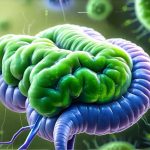Our gut is often called our “second brain” for good reason. It’s not just about digestion; it profoundly impacts everything from our immune system and mental health to energy levels and even skin condition. In today’s world of processed foods, stress, and antibiotic overuse, the delicate balance within our gut microbiome can easily be disrupted. When this happens, a whole host of unwelcome symptoms can arise, signaling that your gut needs some serious attention – a reset, if you will. Ignoring these signs isn’t just uncomfortable; it can lead to long-term health issues. This article explores common indicators that your gut is crying out for help and offers insights into how you can begin restoring balance.
Many people unknowingly live with chronic low-grade digestive distress, accepting it as “normal.” But feeling consistently bloated, gassy, or having irregular bowel movements isn’t something to simply endure. It’s a clear sign that your gut flora might be imbalanced and struggling to efficiently process food. A diet reset isn’t about restrictive dieting; it’s about nourishing your gut with the right foods and eliminating those that are causing inflammation and disruption.
Recognizing the Signals: Common Gut Health Symptoms
The symptoms of an unhappy gut can manifest in diverse ways, making diagnosis tricky. It’s rarely just about stomach upset. Beyond the obvious digestive complaints, look for more subtle indicators like fatigue, mood swings, or skin issues. For example, consistent bloating after specific foods suggests a food intolerance or sensitivity that’s disrupting your gut microbiome. Pay attention to how you feel after eating – not just during.
Chronic indigestion, heartburn, and acid reflux are also red flags. While occasional discomfort is normal, persistent symptoms indicate something isn’t right within the digestive system. These issues often stem from imbalances in gut bacteria that lead to increased inflammation or impaired digestion. Furthermore, a weakened immune system – frequent colds or infections – can be linked to an unhealthy gut, as about 70-80% of your immune cells reside there.
Don’t dismiss seemingly unrelated symptoms either. Skin conditions like eczema, acne, or psoriasis have been increasingly linked to gut health. The “gut-skin axis” is a recognized connection where imbalances in the gut microbiome can trigger inflammation throughout the body, manifesting as skin problems. A compromised gut lining (often referred to as “leaky gut”) allows undigested food particles and toxins to enter the bloodstream, potentially triggering an immune response that contributes to these conditions.
The Impact of Diet & Lifestyle on Gut Health
Our modern diet plays a huge role in shaping our gut microbiome. Highly processed foods, laden with sugar, unhealthy fats, and artificial additives, feed harmful bacteria while starving beneficial ones. Conversely, a diet rich in fiber-rich fruits and vegetables, fermented foods, and healthy fats promotes a thriving and diverse gut ecosystem. Think of it like gardening – you need to cultivate the right environment for positive growth.
Lifestyle factors also significantly impact gut health. Chronic stress is a major disruptor, as it alters gut motility, reduces beneficial bacteria, and increases inflammation. Lack of sleep can have similar effects. Regular physical activity, on the other hand, supports a healthy gut by promoting blood flow and reducing stress levels. Antibiotics, while sometimes necessary, indiscriminately kill both good and bad bacteria, disrupting the delicate balance within your gut. This is why it’s often recommended to incorporate probiotic-rich foods or supplements after antibiotic treatment.
Implementing a Gentle Gut Reset: Dietary Changes
A successful gut reset doesn’t require drastic measures. Start with small, manageable changes that you can sustain long-term. Begin by eliminating common inflammatory foods like processed sugars, refined carbohydrates, and excessive amounts of alcohol. Introduce more fiber into your diet through whole grains, fruits, vegetables, and legumes. Fiber acts as “food” for beneficial gut bacteria, helping them flourish.
Focus on incorporating fermented foods such as yogurt (with live cultures), kefir, sauerkraut, kimchi, and kombucha. These are natural sources of probiotics – live microorganisms that can help restore balance to your gut microbiome. Also, consider adding prebiotics, which are types of fiber that feed the good bacteria already in your gut. Good sources include onions, garlic, bananas, asparagus, and oats. Hydration is also key; drink plenty of water throughout the day to support optimal digestion and nutrient absorption.
The Role of Food Sensitivities & Elimination Diets
Sometimes, even seemingly healthy foods can trigger digestive distress if you have a sensitivity or intolerance. Common culprits include gluten, dairy, soy, and corn. An elimination diet can be a helpful tool for identifying these triggers. This involves removing suspected foods from your diet for a period (typically 2-3 weeks) and then gradually reintroducing them one at a time while monitoring for symptoms.
It’s important to approach an elimination diet carefully and ideally with the guidance of a registered dietitian or healthcare professional. Removing too many food groups simultaneously can lead to nutrient deficiencies and make it difficult to pinpoint specific triggers. Keep a detailed food diary, noting everything you eat and any associated symptoms. This will help you identify patterns and understand which foods are contributing to your digestive issues.
Long-Term Gut Health Maintenance
A gut reset isn’t a one-time fix; it’s about adopting sustainable lifestyle habits that support long-term gut health. Continue prioritizing fiber-rich foods, fermented foods, and adequate hydration even after you’ve addressed initial symptoms. Manage stress through techniques like yoga, meditation, or deep breathing exercises. Get regular exercise and prioritize sleep. These are all essential components of a healthy gut ecosystem.
Ultimately, listening to your body is the most important thing. Pay attention to how different foods make you feel and adjust your diet accordingly. A happy gut translates to improved overall health, increased energy levels, and a stronger immune system – making it one of the most valuable investments you can make in your well-being.


















